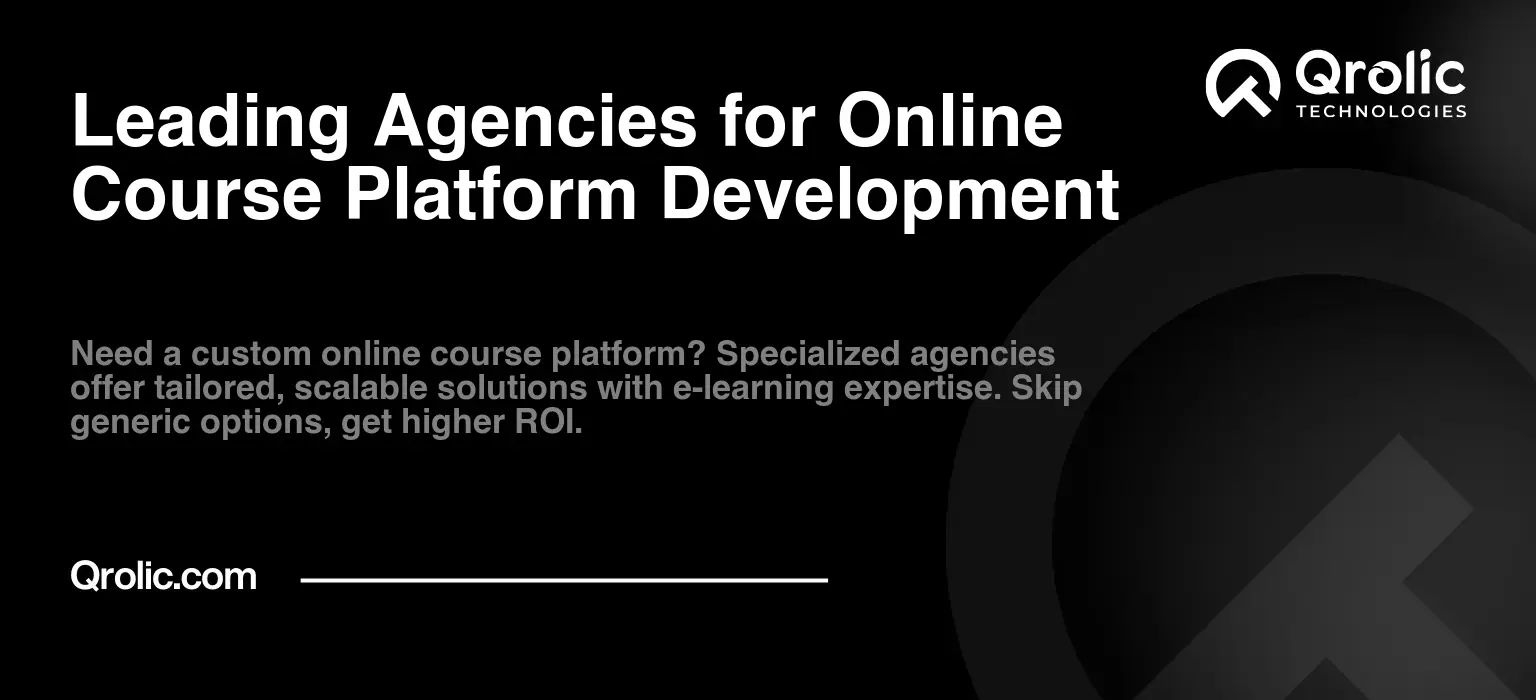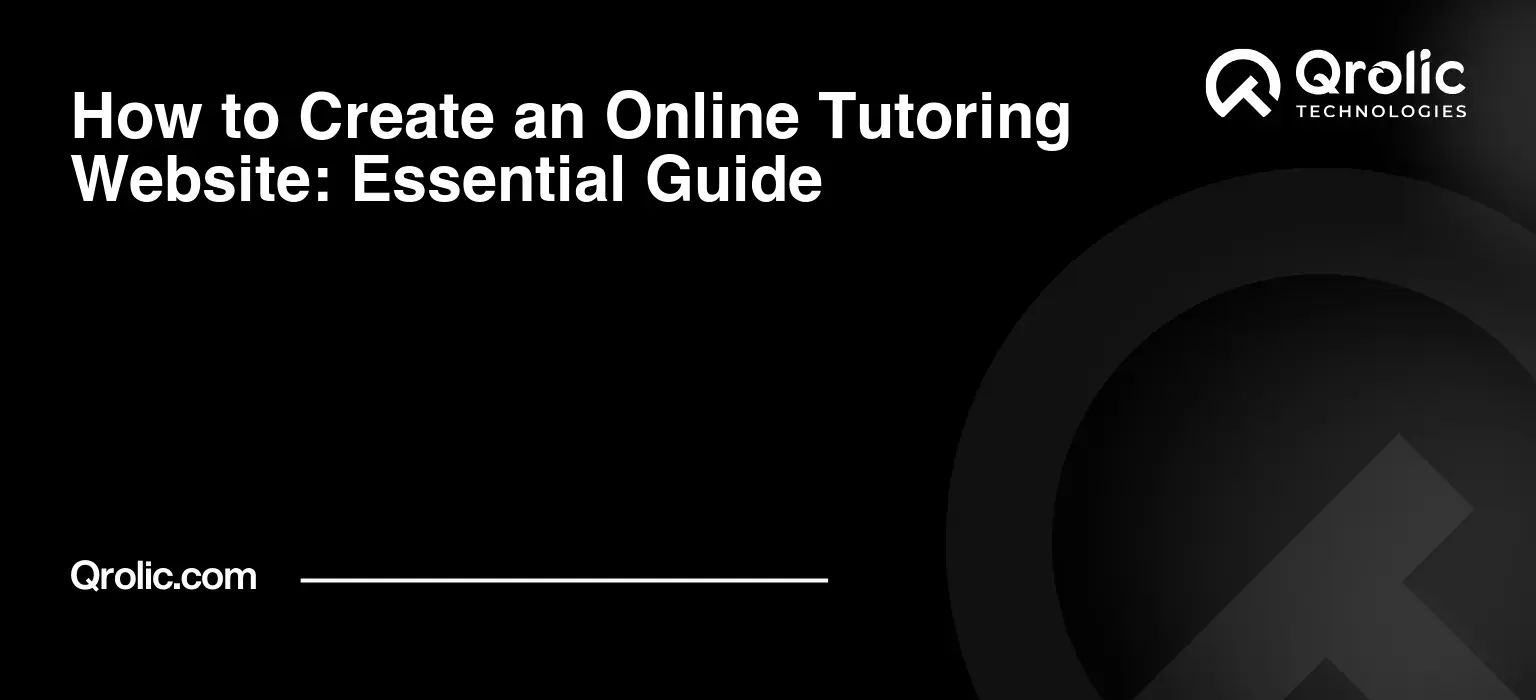The digital learning landscape is exploding, and with it, the demand for robust, engaging, and user-friendly online course platforms is soaring. If you’re looking to launch your own educational empire, or simply expand your existing training programs, you’ll need a partner with the expertise to bring your vision to life. That’s where specialized agencies for online course platform development come in. These aren’t your run-of-the-mill web developers; they’re experts in building the specific features and functionalities needed for a successful learning environment.
Quick Summary:
- Hire specialized agencies for custom platforms.
- Focus on scalability, features, and strong UX.
- Define your needs and research agency expertise.
- Choose a partner offering ongoing support.
Table of Contents
- What Are Online Course Platforms?
- Why Choose an Agency for Platform Development?
- Key Benefits Summary:
- When to Consider a Specialized Agency
- When to NOT hire an Agency:
- How to Choose the Right Agency for You
- Key Takeaways for Selection Process:
- Features to Look for in a Robust Online Course Platform
- Prioritizing Key Features:
- The Importance of User Experience (UX) Design
- Key UX Design Elements:
- Step-by-Step Guide to Platform Development
- Key Actions Throughout the Process:
- How Qrolic Technologies Can Help
- Consider Qrolic For:
- Final Thoughts
What Are Online Course Platforms?
Before we dive into agencies, let’s clarify what we mean by an online course platform. Think of it as your digital schoolhouse. It’s the software and infrastructure that allows you to:
- Host and Organize Courses: Structure learning paths with modules, lessons, and various content types (videos, text, quizzes, etc.).
- Manage Learners: Enroll students, track progress, and facilitate communication.
- Deliver Content Securely: Protect your valuable materials from unauthorized access.
- Enable Interaction: Foster a sense of community through forums, messaging, or live sessions.
- Monetize Content: Process payments and manage subscriptions.
Essentially, it’s a comprehensive solution to take your expertise online and share it with the world. It’s the difference between handing out leaflets in a parking lot and having a thriving educational community.
Why Choose an Agency for Platform Development?
You might be thinking, “Why not just use a pre-built solution or hire a generalist developer?” While those can be starting points, there are key advantages to partnering with a specialist agency:
- Deep Understanding of E-Learning: They live and breathe online education. They know the nuances of effective pedagogy, gamification, and user experience that makes learning stick.
- Tailored Solutions: Pre-built platforms often come with limitations. Agencies can craft a platform that perfectly matches your unique needs, brand, and target audience.
- Scalability: As your student base grows, your platform must keep up. Agencies build with scalability in mind, ensuring smooth performance and expansion.
- Dedicated Support: You won’t be left to troubleshoot on your own. Agencies offer ongoing support, maintenance, and updates.
- Efficiency and Speed: Expertise translates to faster development timelines, getting you to market quicker.
- Higher ROI: While investment might seem higher upfront, the long-term benefits of a tailored, high-performing platform lead to a better return.
Think of it like this: you wouldn’t ask a plumber to build a skyscraper. You need a team of specialists who understand the unique challenges and opportunities of this space.
Key Benefits Summary:
- Specialized expertise in online learning
- Custom solutions that match your specific requirements
- Scalable platforms to handle growth
- Ongoing maintenance and support
- Faster development timelines
- Improved long-term ROI
When to Consider a Specialized Agency
Knowing why to choose an agency is important, but when is crucial too. Here are some situations where working with an agency becomes essential:
- Complex Needs: If you require advanced features like AI-powered assessments, customized learning paths, or integrations with other systems, an agency is the right choice.
- Unique Brand Identity: You need a platform that reflects your brand, not a generic template.
- Scalability Goals: If you plan on growing your courses significantly, a custom built platform can accommodate that.
- Lack of Internal Expertise: You don’t have the development or design capabilities in-house.
- Need for a Competitive Edge: You want a learning experience that sets you apart from competitors.
- Integration Requirements: You need seamless connections with other software like CRM, marketing automation, or payment gateways.
- Desire for Long-term support: If you want to feel supported for the long haul, agencies typically provide support and maintenance.
When to NOT hire an Agency:
- Very Basic Needs: If you’re starting small with a simple course and can use a basic platform, you may not need a full development agency
- Limited Budget: Agencies involve a more significant investment than pre-built options.
- Strict Deadlines: While agencies are generally faster, a very strict timeline may be tough for all agencies to meet.
How to Choose the Right Agency for You
Selecting the right agency is a critical decision. It’s like choosing a co-captain for your ship – you need someone reliable, experienced, and aligned with your goals. Here’s a step-by-step approach:
- Define Your Needs:
- What kind of courses will you offer?
- What are your must-have features?
- What is your budget?
- What are your scalability plans?
- What are your aesthetic preferences?
- Research Potential Agencies:
- Portfolio Review: Look at past projects and assess their quality, user-friendliness, and alignment with your vision.
- Client Testimonials: What do other clients say? Look for both good and less positive feedback.
- Industry Focus: Do they specialize in e-learning, or are they generalists?
- Technology Stack: Do they use technologies that are scalable, secure, and appropriate for your project?
- Evaluate Communication & Process:
- How responsive are they?
- Do they understand your needs?
- Do they have a clear process?
- Are they transparent with timelines and costs?
- Assess Technical Skills:
- Are they proficient in the technologies they use?
- Do they have a good understanding of e-learning best practices?
- Do they offer quality assurance and testing?
- Consider the Culture Fit:
- Are they a good fit for your team?
- Do they share your vision?
- Is there an open channel for feedback?
- Ask the Right Questions:
- What is your process?
- How do you handle revisions and feedback?
- What is included in the project cost?
- What kind of support do you provide post-launch?
- What type of security measures do you implement?
- How do you ensure your platform remains scalable?
- How long will this platform take to develop?
By taking a methodical approach, you’ll increase your chances of finding an agency that will become a true partner in your online education journey.
Key Takeaways for Selection Process:
- Clearly define your project needs.
- Thoroughly research potential agencies.
- Evaluate their communication and processes.
- Assess their technical skills.
- Consider the culture and fit for collaboration.
- Ask detailed questions about all project aspects.
Features to Look for in a Robust Online Course Platform
A great platform isn’t just about pretty design. It needs the right features to provide an engaging and effective learning experience. Here are some essential features to consider:
- User-Friendly Interface: Intuitive navigation, clear layouts, and mobile responsiveness are crucial for a seamless experience.
- Course Management Tools: Easy tools for creating courses, uploading content, and organizing materials.
- Content Variety: The ability to upload and embed diverse media types (videos, audio, text, presentations, PDFs).
- Interactive Quizzes and Assessments: Options for different quiz types, feedback mechanisms, and progress tracking.
- Learner Progress Tracking: Detailed analytics that allow students to monitor their learning and identify areas for improvement.
- Communication and Collaboration: Forums, messaging, or live chat features for peer-to-peer interaction.
- Payment and Subscription Management: Secure and reliable payment processing, options for different subscription models, and coupon code management.
- Security and Data Protection: Secure login procedures, data encryption, and compliance with data privacy regulations.
- Integration Capabilities: Ability to integrate with other useful systems such as CRMs, email marketing platforms and accounting software.
- Scalability and Performance: A platform built to handle an increasing number of users and courses without compromising performance.
- Reporting and Analytics: Detailed data about user engagement, course performance, and sales that helps with making informed decisions.
These features can significantly enhance the learning experience and give you the tools to scale and grow your online education business.
Prioritizing Key Features:
- Focus on the core experience – user-friendliness, robust course management, variety of content options.
- Consider features that will set you apart, like interactive quizzes, gamification, and strong communication tools.
- Choose payment systems that are user-friendly and reliable.
- Ensure security and data protection are paramount.
- Always opt for scalability to accommodate growth.
The Importance of User Experience (UX) Design
An often-overlooked aspect of online course platform development is User Experience or UX. UX focuses on the overall experience of the user, ensuring the platform is not just functional, but enjoyable and easy to navigate. A well-designed UX is directly linked to student engagement and retention, and ultimately, the success of your online courses. Here’s why it matters:
- Reduces Confusion and Frustration: An intuitive platform will prevent learners from getting lost or confused, allowing them to focus on learning.
- Increases Engagement: A positive user experience leads to higher levels of engagement, which improves learning outcomes.
- Boosts Retention Rates: Students who are frustrated or confused are less likely to complete courses.
- Enhances Brand Perception: A professional, easy-to-use platform reflects positively on your brand.
- Drives Word-of-Mouth Referrals: Satisfied users are more likely to recommend your platform to others.
- Minimizes Support Requests: A well designed platform reduces confusion, saving you time and resources.
Key UX Design Elements:
- Intuitive Navigation: Easy-to-find courses and resources.
- Clear Visual Hierarchy: Content is organized logically and easily scanned.
- Consistent Design: A unified brand experience across the entire platform.
- Mobile Responsiveness: Platform should work flawlessly on any device.
- Accessibility: Adherence to accessibility guidelines to cater to all users.
- Feedback Mechanisms: Ways for users to easily provide feedback.
Step-by-Step Guide to Platform Development
Here’s a simplified roadmap outlining the typical process for developing a custom online course platform.
- Planning and Discovery:
- Detailed needs analysis.
- Defining target audience.
- Developing course structure and content.
- Establishing clear objectives and KPIs.
- Budget and timeline planning.
- Platform Design:
- User journey mapping.
- Wireframing and prototyping.
- Visual design and branding.
- User experience testing.
- Development:
- Front-end and back-end programming.
- Integration of various features.
- Security measures and Performance Optimization.
- Testing and Quality Assurance:
- Thorough testing on multiple devices and browsers.
- Bug fixing and performance tuning.
- User acceptance testing.
- Launch and Deployment:
- Platform deployment and setup.
- Content migration.
- User training.
- Ongoing Support and Maintenance:
- Regular security updates and backups.
- Technical support and troubleshooting.
- Platform maintenance and performance monitoring.
- Enhancements and new feature implementations.
This is a general guideline and the specific steps may vary depending on the project’s complexity and your needs.
Key Actions Throughout the Process:
- Maintain clear and consistent communication between your team and the agency
- Regularly provide feedback and ask for updates.
- Be prepared to test and re-test elements as needed.
- Prioritize data security and protection.
- Focus on creating the best possible user experience.
How Qrolic Technologies Can Help
If you’re seeking a reliable partner to create your online course platform, Qrolic Technologies (https://qrolic.com/) stands out as a strong contender. They have a proven track record of developing high-quality and custom solutions for various businesses. Qrolic Technologies bring years of experience and expertise to the table. They understand the unique demands of the e-learning industry and are dedicated to creating engaging and effective online learning environments.
What sets Qrolic apart?
- Custom Development Expertise: Qrolic doesn’t just offer cookie-cutter solutions. They build custom platforms that match your exact needs and vision.
- Focus on Scalability: They develop platforms designed to grow and scale seamlessly with your business.
- User Experience-Centric Approach: Their solutions focus on user-friendliness and a positive learner experience.
- Expertise in E-Learning Features: They are well-versed in all the necessary e-learning tools and functionalities (LMS), including secure content delivery, quizzes, assessments, and gamification strategies.
- Dedicated Project Management: From initial consultation to deployment and maintenance, they provide a dedicated project manager to keep you informed and involved every step of the way.
- Technology Diversity: They have skills in multiple technologies and can choose the tech stack that is best for your project goals and budget.
- Ongoing Support and Maintenance: Qrolic offers continuous support, maintenance, and updates to ensure the optimal performance of your platform.
- Transparent and Collaborative Process: They work closely with clients, prioritizing transparency and open communication.
Whether you’re a solo entrepreneur launching your first course or a large institution moving your programs online, Qrolic Technologies has the resources and expertise to bring your e-learning goals to fruition.
Consider Qrolic For:
- Customized platform development that meets your specific needs
- Scalable solutions that grow with your business
- Emphasis on user experience and engagement
- Expertise in all types of e-learning tools and functions
- Dedicated project management for a streamlined process
- Ongoing support and maintenance
Final Thoughts
The world of online learning is dynamic and full of opportunities. Choosing the right agency for your online course platform development is crucial for success. By understanding the benefits, knowing when to seek professional help, and carefully evaluating your options, you can create an exceptional learning experience and make a significant impact on the lives of your students. The journey of bringing your knowledge to the digital world might seem daunting, but the right agency can make the process easier and more fruitful. Remember to ask questions, do your research, and choose a partner that shares your vision and values. With a solid platform and effective strategies, your educational journey has the potential to not just thrive but to change the world, one course at a time. Whether you choose Qrolic or another provider, be sure they are the right fit and have the knowledge and capacity you need to achieve your educational goals. This journey is not just about teaching, it is about impacting and inspiring through the power of education.









